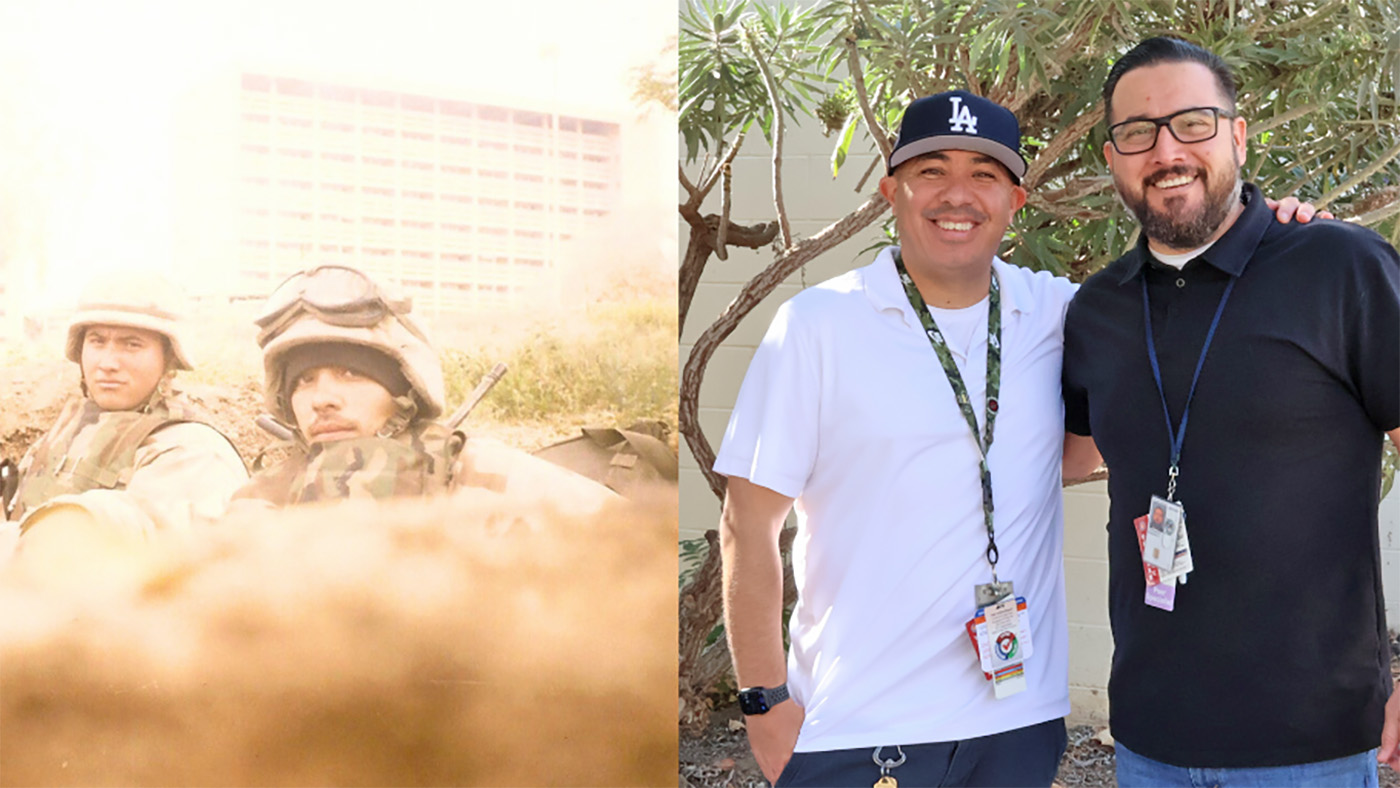For Marine Corps Veterans Noe Tejeda and Robert Hernandez, the brotherhood that began in battle more than 20 years ago continues to this day. As lead peer specialist and peer specialist at Greater Los Angeles VA, the two had each other’s backs while in Iraq and still have each other’s backs as they “continue the mission,” in Tejeda’s words.
As peer specialists, the two are part of a group of Veterans with lived experience who help guide other Veterans through recovery from mental health issues, homelessness, substance use and other challenges they face in transitioning to civilian life.
Peer specialists are there for Veterans every step of the way, helping connect them to critical services and resources through VA and its community partners. “The mentality we all have, never leave a brother behind, I think that really sticks with us,” said Hernandez.
The bond between Tejeda and Hernandez speaks to the power of peer support, both for each other and for the Veterans they serve.
From Iraq to Los Angeles VA
Tejeda and Hernandez first met as roommates in the military. With both hailing from California, they became fast friends.
Both went on to become assault amphibious vehicle crew chiefs. While each chief typically leads his own vehicle, they requested to be assigned to the same one. After 9/11, they deployed together.
“Prior to going to war I remember telling his mom, ‘Everything is going to be ok. I’m going to bring your son back,’” said Tejeda.
Years later, Tejeda had started working in Veteran services and, while Hernandez had found success in a civilian job, it didn’t provide the fulfillment or sense of connection he was looking for.
Tejeda reached out to check on Hernandez. “I told him I work with Veterans and I think it’s something you might be interested in,” Tejeda said. “Robert took that risk, but at the same time he found his passion.”
Both had been through their own recovery journeys with help from VA, which put them in a unique position to guide other Veterans through the process. Both eventually ended up working at Greater Los Angeles VA.
“We just never really separated,” said Hernandez. “He checks on me. I check in on him. We’re still there supporting each other.”
Creating true family ties, Hernandez is the godfather to Tejeda’s son.
What peer support specialists do
Peer specialists are a growing part of VA’s work in helping Veterans through recovery and rebuilding their lives. Once paired with a Veteran, they work as a team, along with the Veteran’s other providers, to identify areas of need, then help the Veteran get access to the support and services that can meet those needs.
“We’re Veterans who have gone through our own struggle and we’re here to empower those individuals,” said Tejeda. “We’re always trying to identify their needs and connect them with the right resources. And sometimes Veterans just need another Veteran to hear what they’re going through.”
Tejeda and Hernandez hope the impact of peer specialists continues to expand, including into the medical setting.
“Peers are on the front line,” said Hernandez. “As Veterans, we know what the Veteran is going through, and it’s all about our experiences and how we connect with them.”
Topics in this story
More Stories
Bob Jesse Award celebrates the achievements of a VA employee and a team or department that exemplifies innovative practices within VA.
The Medical Foster Home program offers Veterans an alternative to nursing homes.
Watch the Under Secretary for Health and a panel of experts discuss VA Health Connect tele-emergency care.







I am glad the VA has started something good to build upon. Yes, we veteran women have a lot to work on ourselves and it all starts by creating solutions. Contact your local VA and ask about the special women VA clinics. I seen some in some hospitals.
This is a great service to our veteran brothers and sisters. How can I find more information on being a part of this?
An excellent article about Peer Support Specialists was inspiring to me to check with the DC VA Medical Center for mental health issues I’m having. I’m a USN, retired veteran with 20 years of active duty service and live at the Armed Forces Retirement Home in Washington, DC.
The phrase,”Never leave a brother behind,” totally runs me raw, especially as a 22-year retired military FEMALE veteran. Obviously, this wasn’t nor is it supportive of those females who are veterans. What a disgrace to the VA and their lack of consideration. I was so excited and believed the VA would finally lead us out of the archaic military world but that’s obviously a dream. Talk is cheap. VA should know better!
Kelly McFee,
I understand your frustration, but please note that this article was written by a (I assume) female employee of the VA. This is a short article highlighting one single instance of a VA program helping another Veteran. It seems a little much to drag Hannah Sentenac’s writing into the mud like this. They used a common turn of phrase related to the two male subjects of the article.
I struggle to find trustworthy mental health services with the VA, so I understand your frustration. Women need more representation, but this is not the way to get it. We are dying, dozens a day from lack of access to quality care when we needed it. We were all fed lies about our careers being ruined for seeking mental health services. Please, work on bringing your fellow Veterans up instead of picking them further apart.
Excellent. Now let’s work to recall and remove con man Trump on 1/21/25. He shows no real respect for our military and veterans.